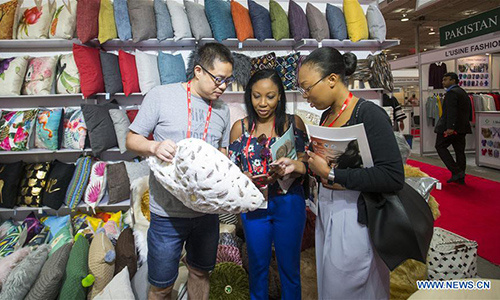
People visit the 2018 Apparel Textile Sourcing Canada Trade Show at International Center in Toronto, Canada, on Aug. 20, 2018. The annual three-day event, which kicked off on Monday, is expected to draw over 500 exhibitors and 5,000 buyers from across the world. (Photo: Xinhua/Zou Zheng)
After four years of talks, Canada has abandoned efforts to reach a free trade deal with China, which would have been promising for Canada amid global uncertainties, especially when its trade relationship with its biggest trade partner, the US, has been worsening, experts said. They warned that Canada is choosing to follow the US at the expense of its economic future.
According to a report by the Canadian newspaper The Globe and Mail, citing Canada's Foreign Affairs Minister François-Philippe Champagne, Canada quit the talks and is not planning to resume them, accusing China of "assertive, coercive diplomacy."
China is still the second-biggest trade partner of Canada despite political tensions, trailing only the US. In 2019, bilateral trade dropped 6.9 percent to $74.04 billion. Canada's exports to China, which mainly focus on minerals and paper products, were slashed by 17.8 percent, and imports from China, including machinery and textiles, dropped 3 percent.
A comprehensive trade deal with China has much potential and would provide Canada with much-needed opportunities, including drastically expanding the country's share in the Chinese market for agricultural products.
"It is very regretful that Canada chose to quit after four years of efforts under US pressure." Qian Feng, director of the research department at the National Strategy Institute of Tsinghua University in Beijing said. "For Canada, China is an increasingly important export destination, as the US has been repeatedly threatening Canada with tariffs."
The US has been threatening to impose tariffs on one of its biggest categories of Canadian imports - steel and aluminum - since 2018, citing concerns over national security. Although Canada was later exempted from the duties, the Trump administration re-proposed a 10 percent tariff on certain types of Canadian aluminum in August.
"It is not a great time for Canada in terms of trade, and it should try to find more diverse partners, not more enemies," Qian said.
Canada's excessive reliance on trade with the US has weakened its autonomy as an independent economy and left it more vulnerable to US sanctions, as over 75 percent of Canadian exports were to the US. In 2018, negotiations on the free trade deal between China and Canada were halted for almost a year due to pressure from the US, but talks later resumed as Canada sought more opportunities with China.
However, despite growing uncertainties in Canada's trade relationship with the US as well as the economic stakes, Canada continues to be influenced by the US not only on trade, but also in its diplomacy and legal system, including the detention of Huawei CFO Meng Wanzhou.
While Chinese Ambassador to Canada Cong Peiwu has frequently criticized the Canadian side in recent months for being an accomplice of the US government in the Meng case, the Canadian legal system is also facing growing questions over its independence and integrity as the case is widely seen as a test of the Canadian legal system.
Western media outlets have been reporting "exclusive" stories that are not relevant to the case. According to a recent exclusive report by the Reuters, some senior executives of Huawei - Ken Hu and Guo Ping, who are also rotating chairmen of the company - had close ties with Skycom, the company that stands at the center of US accusations against Huawei.
"Much of what Reuters disclosed regarding Brazil and the connection between the two companies is not relevant to the charges against Meng Wanzhou," Gary Botting, author of Extradition between Canada and the US, told the Global Times in an e-mail.
The larger question is, why arrest Meng and not the other, larger players? he asked.
In the eyes of this Canadian legal expert, the US is desperate to undermine Huawei's 5G technology, to "slay the giant" by fair means or foul. The political end of giving US 5G corporations a head start by holding back the clear front-runner justifies the means, which in Botting's view constitutes an abuse of power and abuse of process by the US and Canada, acting in concert to ensnare and eventually destroy the "dragon".
However, the suspension of the trade talks is likely to be temporary, according to Pan Xiaoming, a senior research fellow at the Shanghai Institutes for International Studies. Canada will come back to the negotiation table eventually.
"It is essential for Canada to build a formal trade framework with China if it wants to truly engage in the Chinese economy," Pan said. "Probably Canada is suspending the talks under US pressure. But in the long run, the Chinese market is too big to be ignored by either Canada's government or its companies."


